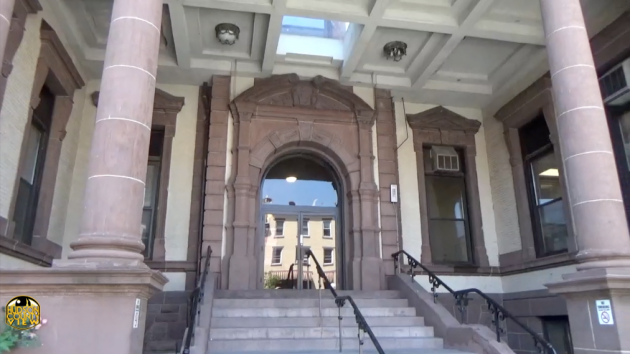The Hoboken City Council introduced a $1.3 million budget for its citywide special improvement district, which would establish an assessment on business and property owners in the city.
By Corey McDonald/Hudson County View
The $1,325,000 budget for the 2020 fiscal year was approved for introduction by the council Wednesday night, about three months after approving the SID’s formation in July.
Committee members spent the better part of a year-and-a-half developing the business entity.
The budget would need final approval from the council before the SID is fully functional.
The SID, according to its mission statement, aims to “energize and enhance Hoboken’s business environment” and create a place “where small businesses desire to be and thrive.”
“We have two big goals: we want to partner with the city and be a supplement that the services that the city is already offering,” said Eugene Flinn, a business owner in Hoboken and the president of the SID’s board of directors.
“… And secondly, we don’t want to become a bogged down bureaucratic arm of the government wasting people’s taxpayer money. Our goal is to enhance the reputation and business climate of Hoboken.”
The council will have a 28-day public notice for the budget, and will hold a public hearing on Dec. 4 before moving to adopt the budget.
“This is an amazing opportunity not just for our commercial property and business owners, but for our entire community who want to see our local businesses succeed,” said 2nd Ward Councilwoman and SID committee member Tiffanie Fisher.
“I could not be more proud of the efforts that have gotten us this far,” Fisher added, adding she hopes community members come out for the for the public meeting to show support.
The budget, in effect, establishes an arm of capital for the city’s business community, and would collect funds via an assessment on commercial businesses and residential property owners with more than four units – who will pay an assessment at a rate determined by their property taxes.
Members of the committee who drafted the SID say that the assessment is not a tax – even though every property owners must pay. Failure to pay would end up as a lien on their property.
The SID includes eight subsections of the city where assessments would shift annually. Higher assessments are currently set along Washington Street, First Street, and on the waterfront – but these could shift to areas the committee feels need more attention.
Properties on Washington Street, for example, will pay a 3.3 percent assessment if the budget passes.
The majority of the $1.3 million would work towards visual improvements along the city’s main commercial artery, as well as creating annual events and festivals to enhance retail promotion and business retention.
According to the introduced budget: 39 percent of the collected assessments, or $523,000, would be spent on “visual” improvements in the form of plantings, street furniture and seasonal decorations, as well as additional cleaning around streets and transportation centers.
21 percent, or $283,000, is earmarked for “business attraction,” and includes funds designated for retail market analysis, among other things.
Meanwhile,$414,000 is designated for branding and marketing — specifically via social media, marketing firms, etc.
“We want to help streamline the person who is trying to start the business, and hopefully have some market analysis to give to that person… so they have someone to talk to and help them start a business in Hoboken,” Flinn also said.
During the 28-day period, property owners who would be hit with the assessment will receive notification of the public meeting via mail.
“Special Improvement Districts have proven to be a successful resource for small businesses in other municipalities across the state, and I look forward to it becoming a reality here in Hoboken,” Mayor Ravi Bhalla said in a statement.
Follow Corey McDonald on Twitter @cwmcdonald_










I’m not very smart (at least I admit it!), can someone please explain in plain English: does a condo association on Washington St with two commercial and eight residential units have to pay for this?
The article says “Properties on Washington Street, for example, will pay a 3.3 percent assessment if the budget passes”. Is that 3.3% of the access value of the entire building? Suppose there are both commercial and residential units in the same building?
Those are pretty good questions. Another question that comes to mind is whether the tax surcharge (which is indeed a tax notwithstanding the nonsensical claim that it isn’t) can be passed through to rent controlled tenants.
If it was intended that this not be passed through, and I’m guessing that was the intention, then that an exclusion from the pass through provisions should have been written into the law – ideally through an amendment to the rent control laws, though express language to that effect in the enabling legislation for the SID would probably do the trick. Government officials insisting disingenuously that it’s not a tax, will not.
If clear language was not included in the law the Council needs to get that done before the proverbial sh*t hits the fan.
If it is listed on the tax bill as a SID assessment, it cannot be passed onto tenants as there is no such surcharge in the rent control ordinance.
To take the position that it can be passed along to the tenants would be a creative and illegal interpretation of section 155 of the municipal code.
As long as the issue didn’t fall through the cracks and was considered by the City’s lawyer’s, I’m sure it’s been addressed to the extent necessary. Unintended consequences sometimes occur with legislation of this sort so I’m glad to hear it was considered.
If a building has let’s say a commercial property and five residential units paying rent to the same landlord, that whole building is a commercial property. But if the building has a commercial property and five individual condo units, only the commercial property would be assessed. Individual residential condos will not be assessed, but commercial condos will be assessed, as well as buildings with four or more rental units.
And my understanding is that the assessment cannot be passed through to rent controlled tenants.
In a period of time where small businesses are leaving Washington St because of high rents (see Schnakenbergs and others), the council and mayors office think the best thing to do is to enact a don’t-call-it-a-tax tax on property owners, who will then undoubtedly pass it along to tenants/small businesses in the form of…higher rent.
Certainly this action will solve the problem!
There are many new businesses already opening on Washington Street already.
City government does not set commercial rents they are a set by the market and property owners.
The businesses on Washington Street have done nothing and repeatedly refused to reach into their own pockets promote themselves or make the retail experience more inviting, instead whining for the taxpayers of Hoboken to subsidize them.
Yeah, this is the issue I have. Why do taxpayers have to subsidize businesses? Most of the ones that fail do so because they aren’t competitive in product/service or price, or because commercial landlords have set rents too high. How is that the fault of taxpayers?
I hope there’s pushback on this, businesses should pitch in the majority of funding for their own economic development.